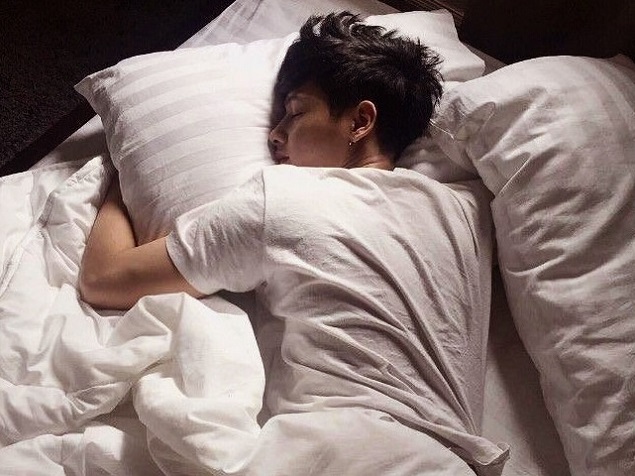Doctors in Japan Warn That COVID-19 infections Can Cause New-Onset of Kleine-Levin Syndrome
Nikhil Prasad Fact checked by:Thailand Medical News Team Sep 02, 2025 5 months, 3 weeks, 20 hours, 47 minutes ago
Medical News: A rare and alarming case after COVID-19
Doctors in Japan have documented a startling medical case where a teenage boy developed a rare sleeping disorder known as Kleine Levin Syndrome (KLS) after recovering from COVID-19. KLS, often nicknamed “sleeping beauty syndrome,” causes repeated episodes of extreme sleepiness that can last for weeks. The boy’s condition has sparked concern among specialists, raising new questions about how COVID-19 can affect the brain and immune system. According to this
Medical News report, researchers believe the infection could have triggered an abnormal autoimmune reaction.
 Doctors in Japan Warn That COVID-19 infections Can Cause New-Onset of Kleine-Levin Syndrome
Who conducted the study
Doctors in Japan Warn That COVID-19 infections Can Cause New-Onset of Kleine-Levin Syndrome
Who conducted the study
The study was carried out by Dr. Daisuke Yoshioka, Dr. Takehiko Yamanashi, and Dr. Masaaki Iwata from the Division of Neuropsychiatry, Faculty of Medicine at Tottori University, Yonago, Japan.
How the illness unfolded
The patient, a healthy 17-year-old male, first contracted COVID-19 during high school. After his recovery, he began experiencing hypersomnolence—sleeping more than 12 to 20 hours daily. Initially thought to be a case of idiopathic hypersomnia, his condition worsened over time. He had recurring two-week episodes every few months, marked by extreme sleepiness, low motivation, appetite loss, and even weight loss. Over the following months, the episodes expanded into a cycle lasting more than a month, including nausea before onset, weeks of excessive sleep, and then weeks of lingering brain fog and poor concentration.
Diagnostic process and treatment attempts
Doctors ran extensive tests including brain scans, blood work, and sleep studies. While some results resembled narcolepsy, the overall pattern was more consistent with KLS. Unlike narcolepsy, which causes sudden short sleep attacks, KLS is defined by prolonged episodes of deep sleep and dramatic changes in behavior. Treatments with lithium and modafinil, two of the most common drugs for KLS, were tried but offered little relief. The boy’s hypersomnolent episodes kept returning, severely disrupting his academic and social life.
Why COVID-19 could be the trigger
Past research has suggested that infections, especially viral ones, often precede KLS episodes. In this case, the clear timing between COVID-19 and the onset of KLS supports the idea that SARS-CoV-2 may have triggered the disorder in a vulnerable individual. Doctors suspect an autoimmune process may be at play, where the immune system mistakenly attacks parts of the brain involved in sleep regulation. While long COVID is known to cause fatigue and poor sleep, KLS is different because it strikes in cycles with near-total recovery between episodes.
Broader implications
This case is significant because it is the first confirmed new-onset Kleine Levin Syndrome directly linked to COVID-19. It highlights th
e importance of not dismissing persistent post-COVID symptoms, especially when they involve sleep and cognition. More importantly, it underscores the urgent need for new treatment strategies for KLS, since current therapies remain inconsistent and patients continue to suffer long-term disruptions in their lives.
Conclusion
The findings from this study stress that COVID-19 can have lingering and unexpected neurological consequences. For the teenager involved, his quality of life, schooling, and future prospects are all deeply impacted by recurring month-long cycles of illness. As no cure exists and treatment options remain limited, this case serves as a reminder of the many ways COVID-19 may alter the human body in ways science is only beginning to uncover. The medical community must now pay closer attention to post-infectious complications like KLS and work urgently toward effective therapies.
The study findings were published in the peer reviewed journal: Psychiatry and Clinical Neurosciences Reports.
https://onlinelibrary.wiley.com/doi/10.1002/pcn5.70199
For the latest COVID-19 News, keep on logging to Thailand
Medical News.
Read Also:
https://www.thailandmedical.news/news/swiss-doctors-warn-that-covid-19-can-cause-hypersomnia
https://www.thailandmedical.news/news/swiss-study-reveals-sleep-issues-in-people-with-post-covid-19-syndrome
https://www.thailandmedical.news/news/utah-study-findings-links-covid-19-to-higher-risk-of-sleep-disorders
